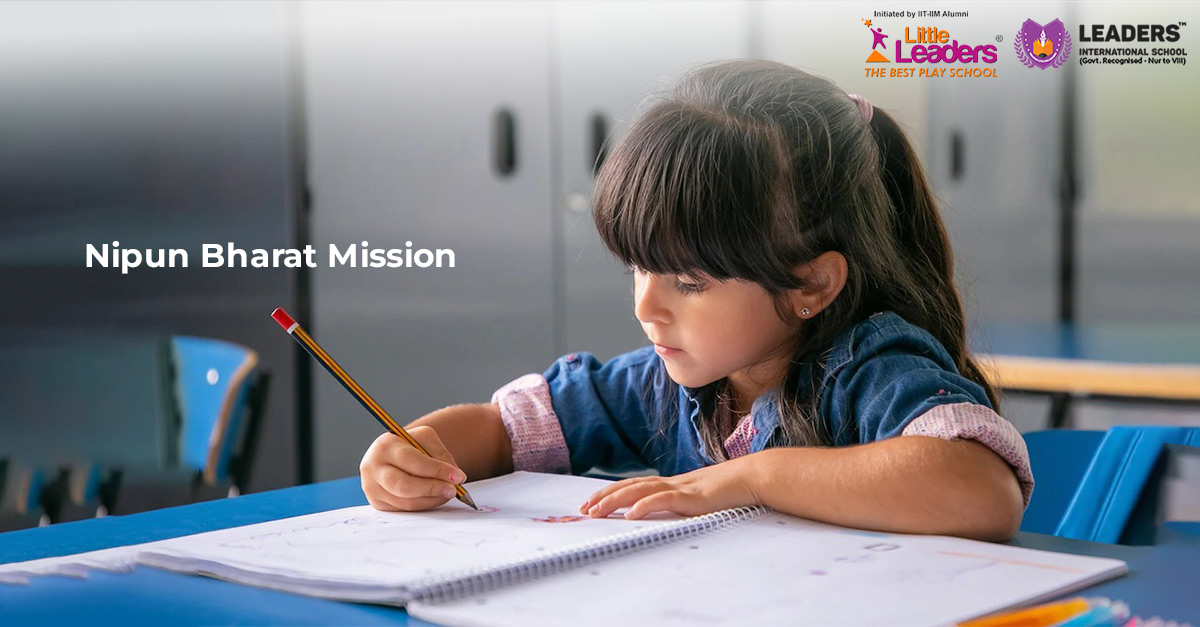
Blogs
Nipun Bharat Mission

The NIPUN Bharat Scheme was introduced by the Union Minister for Education, Shri Ramesh Pokhriyal, on July 5, 2021. The 'NIPUN' Bharat Mission stands for 'National Initiative for Proficiency in Reading with Understanding and Numeracy' Bharat Mission. It was centrally sponsored by Samagra Shiksha Scheme which will focus onretaining students till their foundational learning is complete, improve learning or training modules, increase teacher capacity and track each child’s progress.
OBJECTIVE
NIPUN Bharat Mission is set to ensure that every child in the country necessarily attains foundational literacy and numeracy (FLN) by the end of Grade 3, by 2026-27.
This mission focuses on transforming the monotonous education system into an integrated, enjoyable, all-inclusive and engaging.It instructs teachers or educators to prepare a study plan that develops the students' literary and basic language skills. In view of the challenges of in-service teacher training across the different stages of school education, NCERT has designed an innovative integrated programme of teacher training, now, popularly known as NISHTHA (National Initiative for School Heads‟ and Teachers‟ Holistic Advancement).

The missionwas launched as a part of the National Education Policy (NEP) 2020 and will focus on children of age group of 3 to 9 years including pre-school to Grade 3. The children who are in Class 4 and 5 and have not attained the foundational skills will be provided with peer support, tutor guidance and additional learning materials to strengthen their educational proficiency.
Little Leaders Preschool and Leaders International school has been contributing to this mission by modifying the curriculum in such a manner that learners would be able to comprehend foundational concepts pertaining to numbers, basic measurements, and so on. Similarly, they would go on to become more confident readers with enhanced comprehension and writing abilities.
The key elements in Foundational Language and Literacy are:
- Phonological Awareness: This domain encompasses the skills of word awareness, rhyming awareness, and sound awareness within words, all of which should come from their meaningful interaction with language.
- Vocabulary: Oral vocabulary, reading/writing vocabulary, and morphological study of words are all part of the vocabulary domain. Children, instead of by Harding them, should be taught in a creative way.
- Reading Comprehension: This domain encompasses the abilities to comprehend texts and extract information from them, as well as the ability to interpret texts.
- Reading fluency: Reading fluency refers to a child’s capacity to read a text with accuracy, rapidly, expressiveness, and comprehension so that the material may be understood.
- Writing: This domain encompasses the abilities to write words, as well as the ability to write for expression. Writing words should be focused right from the start when they are learning how to speak.
The major components and elements of foundational Numeracy and Mathematical skills are:
- Pre-Number Concepts: Count and recognize the numeration technique
- Numbers and strategies on numbers:Learn patterns required for the proficiency ofMathematical procedures.
- Measurement: Understand and use common algorithms to perform operations of multiplication, subtraction, addition and division on numbers up to three numerals. At the early stages children try to measure things and this can be implemented in everyday life.
- Shapes and Spatial Understanding: Perform easy calculations in her/his own path up to threedigits and compare these to their day to life activities in various contexts, which will help in easy understanding the subject.
- Patterns: Learn language of relational phrases to expand his/her awareness of space and spatial items. This will help in easy recognition of shapes and sizes.
IMPLEMENTATION OF NIPUN BHARAT MISSION
A five-tier implementation mechanism will be set up at the National- State- District- Block- School level in all States. ‘Samagra Shiksha’ programme was launched subsuming three existing schemes: Sarva Shiksha Abhiyan (SSA), Rashtriya Madhyamik Shiksha Abhiyan (RMSA) and Teacher Education (TE).The aim of the scheme is to treat school education holistically, from pre-school to Class XII.
Around 25 lakh teachers teaching at pre-primary to primary grade will be trained this year on FLN.
The NIPUN Bharat Mission works to improve the efficiency and learning skills of children. For instance, a child should read at least 60 words per minute of a comprehensive text accurately after passing class three.
Stage-wise targets are being set in a continuum from the pre-primary or balvatika classes.
It plans to achieve the anticipated learning outcome by the end of class three. This scheme has shifted Lakshyas from Balvatika to class three to generate awareness on this target among parents, volunteers, community, etc.
RESULT
- Increase the number of students clearing the primary, upper primary and secondary stages.
- Practice of toy-based and unique pedagogies or experimental teaching to make the sessions fun and interesting.
- Forming a training module that focuses on developing motor and physical skills, emotional and social skills, cognitive., numeracy, literacy, life skills and more.
- Encourage children to achieve steep learning for future needs like employment and life decisions.
- Foundational skills enable to keep children in class thereby reducing the dropouts and improve transition rate from primary to upper primary and secondary stages.
- Activity based learning and a conducive learning environment will improve the quality of education.
- Intensive capacity building of teachers will make them empowered and provide greater autonomy for choosing the pedagogy.
- Holistic development of the child by focusing on different domains of development like physical and motor development, socio-emotional development, literacy and numeracy development, cognitive development, life skills etc. which are interrelated and interdependent, which will be reflected in a Holistic Progress Card.
CONCLUSION
Little Leaders School incorporates The NIPUN Bharat Mission which is highly beneficial to children's holistic intellectual development. Students can become adept at basic reading and numeracy in a timely manner. With enhanced skill levels, children will gain confidence to continue studying further and thereby reduce dropout rates. These educational reforms are an essential step toward totally eradicating illiteracy in our country.
